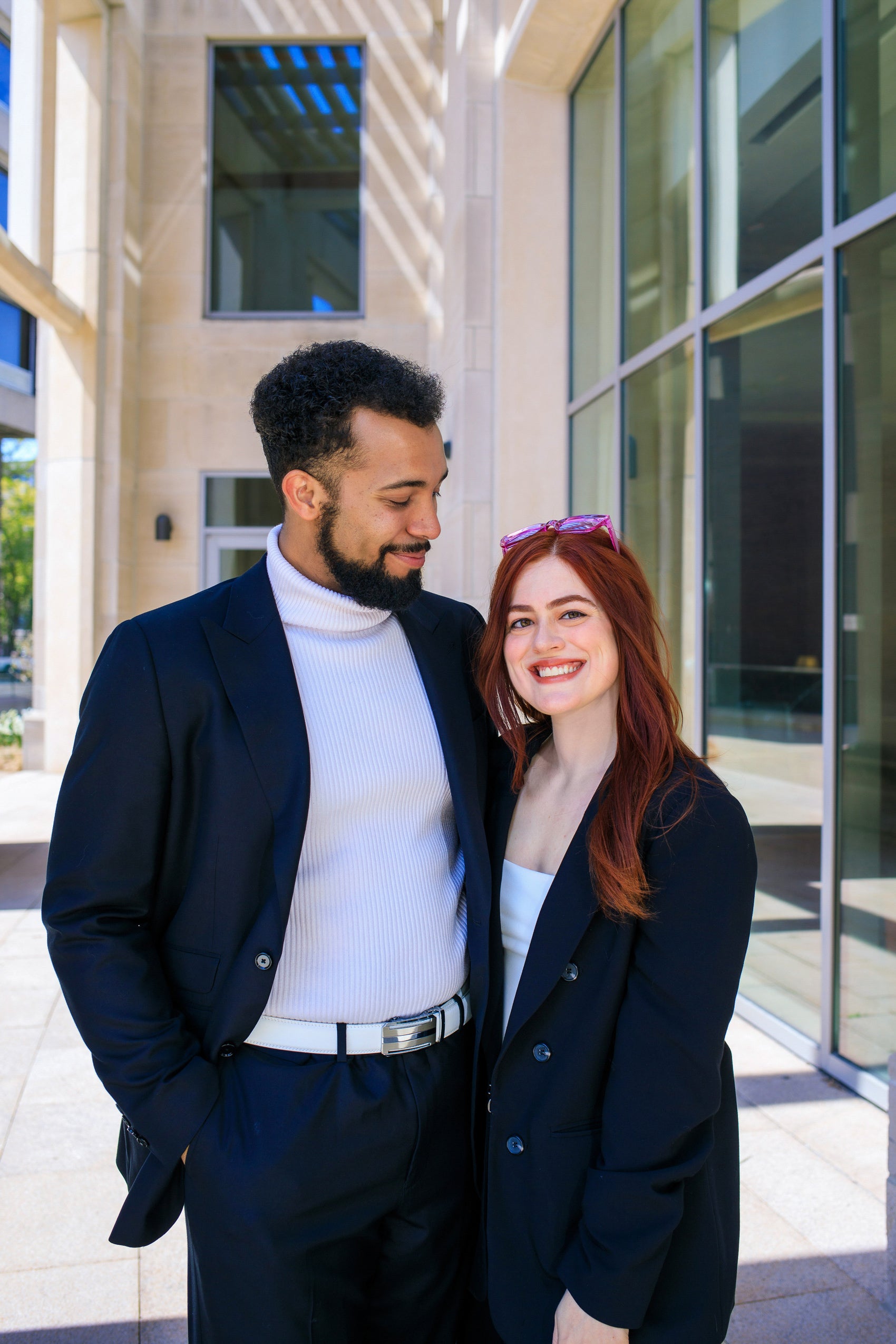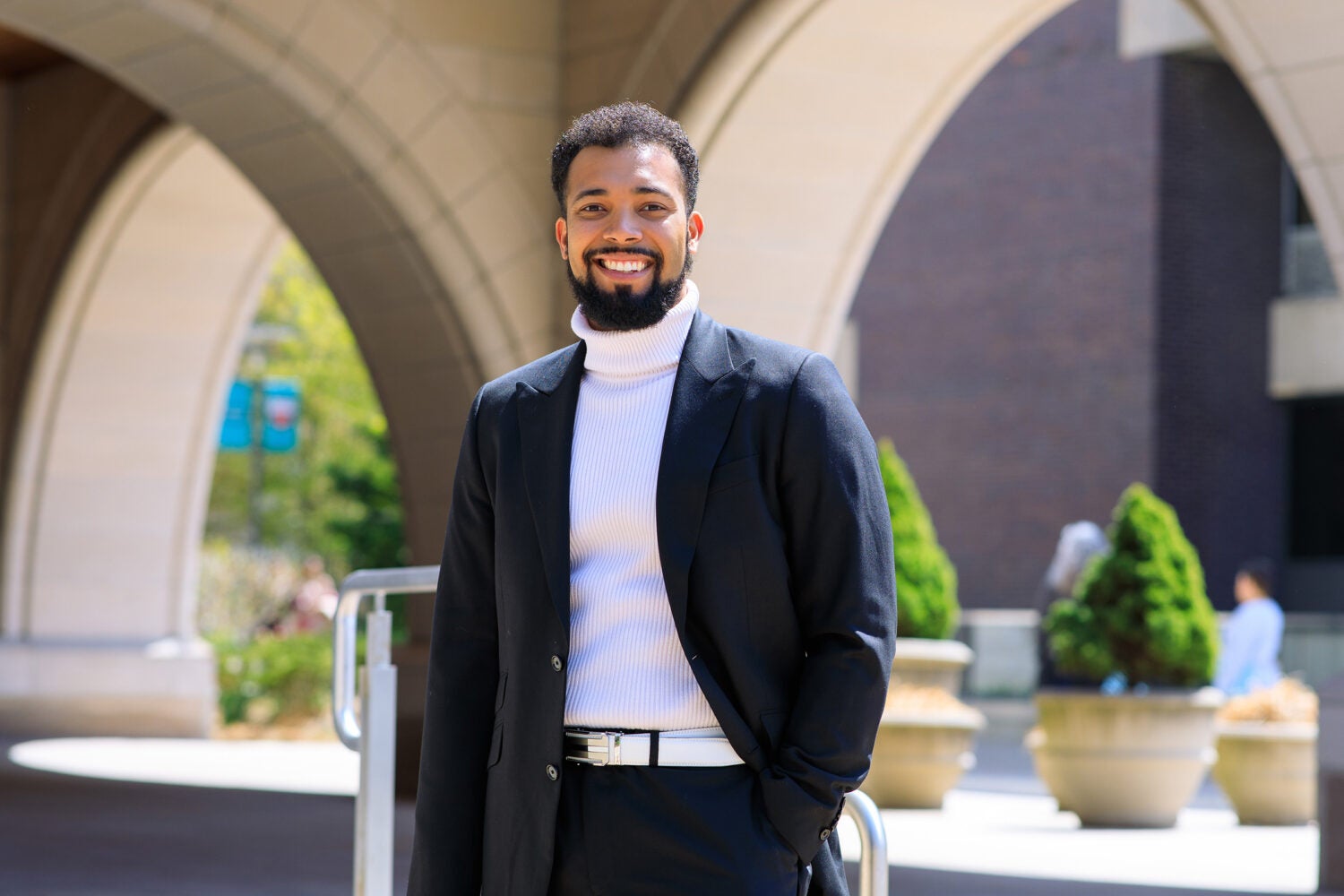The U.S. Army famously exhorts its soldiers to “Be All You Can Be,” and Captain Ryan B. Gunderman ’23 hopes to help the United States Army embrace that advice for itself when he graduates Harvard Law School in May and becomes a JAG, or Judge Advocate General, officer.
Specifically, Gunderman — who took a class on restorative justice at Harvard Law School and represented indigent criminal defendants at Harvard Defenders and the Criminal Justice Institute — wants to work within the Uniform Code of Military Justice, or UCMJ, to reform aspects that he believes have a disparate impact on soldiers of color and those from lower economic backgrounds. As evidence, he cites an internal investigation the U.S. Air Force conducted after the murder of George Floyd that found that racial disparities exist within its adjudication of the UCMJ. Instead of kicking young people out of the military or convicting them for infractions, such as being chronically late to duty, Gunderman wants the Army to consider alternatives that he believes will benefit everyone — and which also are, in his eyes, the right thing to do.
Gunderman, who graduated with honors from the U.S. Military Academy at West Point in 2017, recognizes that the UCMJ provides many protections that the civilian criminal system doesn’t, including that every military defendant is provided with defense counsel no matter their income level. Still, he adds, “the element of commander discretion [in charging and prosecuting soldiers] and the way cases get handled is upsetting to see in a lot of different ways,” including throwing people “in jail for something I think we can rehabilitate them on.
“It was one of the main reasons I wanted to become a JAG,” adds Gunderman, who served three years in the Army as an intelligence officer at Ft. Bliss, Texas, with top-secret security clearance before matriculating at Harvard through the Funded Legal Education Program, which sends commissioned officers to law schools in preparation for becoming JAG officers. He notes that in 2021, Congress — led by Senator Kristen Gillibrand (D-NY) — implemented reforms to the UCMJ to take commander discretion away in cases of serious crimes such as sexual assault and homicide.
Gunderman’s Harvard Law education has provided significant support for his goals. Courses on civilian criminal procedure, as well as his time at the Criminal Justice Institute, where he worked under the supervision of its faculty deputy director, Dehlia Umunna, were influential in his thinking about how the criminal justice system can become more just and equitable.
After his military commitment is fulfilled — he has about 10 years more to serve — he plans to become a public defender with a focus on death penalty litigation, a goal inspired by reading “Just Mercy,” the memoir by Bryan Stevenson ’85. Gunderman took a course on capital punishment taught by Carol Steiker ’86, the Henry J. Friendly Professor of Law, and as a clinical student he worked on capital appeals in Austin, Texas. Also influential was a seminar on restorative and transformative justice he took in his final semester, taught by Adriaan Lanni, the Touroff-Glueck Professor of Law.

Based on what he has learned at Harvard Law, Gunderman believes that the military could benefit from an approach more focused on rehabilitation and reconciliation. “A lot of military-specific infractions could be handled with restorative justice,” he says “Right now, you have a situation where someone raises their right hand to serve their country and when they don’t show up for work, we prosecute them. There has to be a better way to take care of it, and restorative justice is a good way.”
While he concedes such changes in the military will be an “uphill battle,” he adds, “It’s what I believe is the morally right thing to do, and the logical thing to do.” He expects the next decade he will be serving in the Army will enable him to “hopefully have some sort of impact.”
He and his wife, Danielle Gunderman ’24, met as cadets at West Point, from which she also graduated in 2017. They got married in 2018, and were stationed together at Ft. Bliss, in El Paso. “That’s where we really got our first taste of what the Army actually is,” he says, “which is part of the reason we decided, three years in, to apply to law school.”
Ryan and Danielle both attend Harvard as part of the same program and have enjoyed the opportunity to take several classes together, including a seminar on Military Law. The couple were also selected to be resident tutors at Adams House at Harvard College, where they focus on the academic and personal well-being of 36 undergraduates. There, Ryan helped launch the Adams House Human Liberation Collective, which brings in speakers to educate the 500 students in Adams House about professional and community efforts to liberate marginalized groups, including the Transformational Prison Project, a Massachusetts-based organization that brings restorative justice into Massachusetts prisons.
The best part of his Army experience, so far, was as a platoon leader, where he mentored young soldiers serving their country, he says, and having a similar role with Harvard undergrads “is an incredible opportunity to be able to talk to, advise, mentor, and be in community with brilliant, brilliant people who say they are going to save the world, and I fully believe them.”
Gunderman, who is a huge Beatles fan — his favorite song is “Rocky Racoon” — doesn’t know where he’ll be stationed next year as Danielle completes her third year of law school. But he’ll be visiting as frequently as he’s able to spend time with her and to visit with the Adams House undergraduates to whom he’s grown close.
As a JAG, he’ll have to navigate the tension between his education as a defense advocate and potentially being placed in a prosecutorial role. “I’ll have to figure out a way to do that in a perhaps ethical way or use it in some sort of fashion for good. It’s a conversation I’ll have to have in the very near future, that I don’t think someone should be thrown in jail because they missed work,” he says. “To me that does not feel like justice.”
The views expressed are those of the interviewee and do not reflect the official policy or position of the U.S. Army, the Department of Defense, or the U.S. Government.
Want to stay up to date with Harvard Law Today? Sign up for our weekly newsletter.
